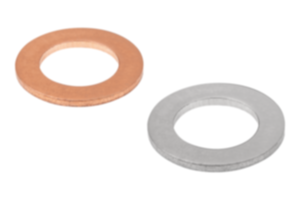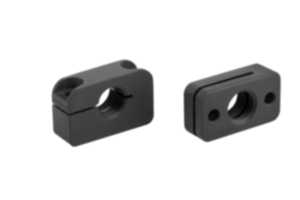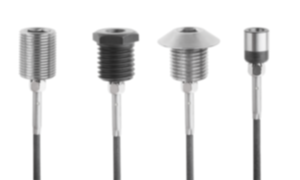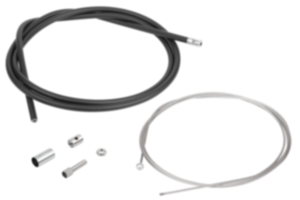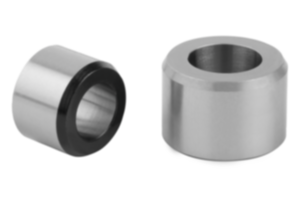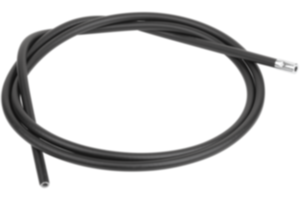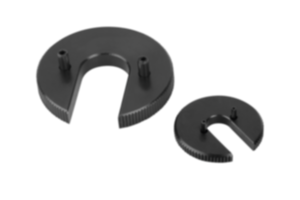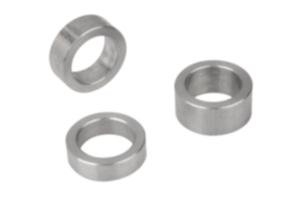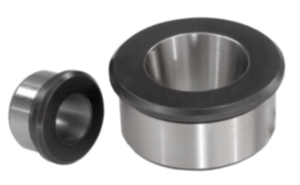Spring plungers
Spring plungers from KIPP
Spring plungers are mechanical components that are used to generate compressive force in a specific direction. They consist of a cylindrical housing with a spring inside and a plunger or thrust piece protruding from the housing. The operating parts are used for positioning, clamping, locking or compensating for tolerances. Their spring force ensures that the thrust piece presses continuously on the workpiece or component, which enables uniform force transmission or position fixation.
Spring plungers are used in numerous industrial sectors and play an important role in optimising and safeguarding production processes. Their ability to exert pressure and compensate for tolerances makes them an indispensable component in many mechanical and automated systems.
Due to the large variety of different material combinations, spring plungers from KIPP are suitable for almost all areas and applications.
In machine construction, they are used to precisely position and securely hold components in place, which is particularly important in clamping fixtures.
In automation technology, they contribute to the precise alignment of workpieces on conveyor lines and in assembly systems.
They also play a decisive role in precision mechanics such as watchmaking or measuring instruments, by holding small parts precisely.
In the automotive industry, they support the precise positioning of car body parts and act as tensioners in brake systems.
The KIPP range of spring plungers
Advantages and uses of these operating parts
KIPP as your manufacturer of spring plungers
The KIPP range of spring plungers
The KIPP range includes 55 different types of spring plungers. The operating parts differ in thread size, outer diameter, length and spring force, among other things. The spring plungers from KIPP are manufactured to standards and are therefore available in the most common thread sizes such as M5, M6, M10 and M12. Depending on the forces acting on the workpiece during machining, it makes sense to select a correspondingly strong spring force.
Spring plungers are available in a variety of materials to ensure the widest possible range of applications. It should be noted that in many models the entire spring plunger is not made of the same material, but the sleeve and ball or pin are made of different materials. The combination of different materials creates a wide range of different versions from which the appropriate product for the respective application can be selected.
Plastic spring plungers are very light and inexpensive. They are characterised by their corrosion resistance and are therefore also suitable for outdoor applications or where they can come into contact with spray water or high humidity.
Spring plungers with steel sleeves or balls are designed for applications where greater forces or harsh conditions act on the product. Due to being made from steel, the components are very robust and also temperature resistant. This means that there is nothing to stop it being used in higher temperature ranges.
By spring plungers that have stainless steel parts, the advantages lay in the corrosion resistance of the sleeves and balls. They are also temperature resistant and slightly lighter than comparable models made of steel. This makes them suitable not only for high temperature areas, but they can also be used outdoors without any problems.
Spring plungers with ball-end thrust pin
Spring plungers with ball-end thrust pins have a spherical shaped thrust pin which exerts punctual pressure. They provide localised support that can act in various directions. An important advantage of this operating part is the adaptability to different surfaces. Compared to types with flat thrust pins, these parts offer more manoeuvrability but less contact surface.
Popular products with this design:
- Stainless steel spring plungers with slot and ball (K0310)
- Stainless steel smooth type spring plungers (K0333)
- Plastic smooth type spring plungers (K0334)
Spring plungers with flat thrust pin
Spring plungers with a flattened thrust pin are used where the pin should lay flat on the surface. They have a flat contact face that ensures even pressure distribution. They are therefore more suitable for flat surfaces than ball-end thrust pins.
The greatest advantage of these operating parts is that they are gentle to sensitive surfaces and still transmit the force evenly.
Matching products:
- Steel spring plungers with hex socket and flattened thrust pin (K1370)
- Steel spring plungers with hex socket, flattened thrust pin and thread lock (K1371)
- Stainless steel spring plungers with hex socket and flattened thrust pin (K1379)
Lateral spring plungers
Lateral spring plungers are commonly used for holding workpieces. Because of this, these items is only available with a thrust pin. The lateral spring plunger exerts lateral pressure onto a workpiece and is therefore ideal for tight spaces. The advantages are clear - space-saving and especially for lateral pressure. Here are the customers favourite - lateral spring plunger (K0368)
Spring plungers with slot
These plungers have a slot in the head that facilitate easy assembly and disassembly using a normal screwdriver. The main advantage is easy handling, especially in confined or hard-to-reach spaces.
These operating parts are more practical for quick adjustments compared to other types. However, it is not as versatile as the plungers with hex sockets.
Popular products:
- Steel spring plungers with slot and ball (K0309)
- Stainless steel spring plungers with slot and ball (K0310)
- Stainless steel spring plungers with slot, ball and thread lock (K0322)
Spring plungers with hex socket
The hex socket design allows the use of an hex key for installation. The hexagonal socket ensures better control and torque transmission during assembly. Compared to plungers with a slot, plungers with an hexagonal socket can be fastened more securely and firmly, but are also somewhat slower in handling.
These are the customers favourites in this series:
- Steel spring plungers with hex socket and ball (K0315)
- Stainless steel spring plungers with hex socket and ball, (K0316)
- Steel spring plungers with hex socket and thrust pin (K0317)
- Steel spring plungers with hex socket, ball and thread lock (K0325)
- Stainless steel spring plungers with hex socket, ball and thread lock (K0326)
- Spring plungers with hex socket and thrust pin, long version (K0657)
Spring plungers to screw in or press in
The operating parts are available for pressing in or screwing in, some of the latter have a thread lock. These prevent the plunger from unscrewing by itself and thus fulfil the same function as a liquid screw lock.
Spring plungers with thread lock differ from the other two options in that the thread to be locked has a notch. This contains an elastically formable nylon insert that prevents the thread from unscrewing on its own.
There are several types of spring plungers available for screwing in. In addition to the conventional slot, there are also products with a hex socket to accept a hex key available. By the screw version, the spring plunger is screwed into a hole from below.
The range includes specially designed models for blind holes. These are screwed into the holes using a special key.
Advantages and uses of these operating parts
Our operating parts offer numerous advantages that make them particularly useful in many technical applications. These are the main advantages of spring plungers:
- Precise positioning and secure fixation: Spring plungers are particularly effective for compensating tolerances in assemblies. This leads to more precise and reliable assembly by ensuring that components are precisely positioned.
- Uniform and constant pressure: These plungers provide a uniform and constant pressing force that varies only minimally during use. This is crucial for applications where a consistently uniform contact pressure is required to ensure consistent performance and quality.
- Reduction of vibrations and noise: Spring plungers effectively absorb vibrations and shocks, resulting in a significant reduction in noise. The ability to dampen vibrations not only protects the components involved, but also extends their service life by minimising mechanical stresses.
- Cost efficiency and long service life: Due to their ability to compensate for tolerances and ensure constant pressure, spring plungers contribute to cost efficiency by reducing component wear and minimising the need for frequent maintenance or replacement parts. Their long service life reduces operating costs in the long term.
- Versatility and flexibility in application: The versatility of spring plungers enables them to be used in a wide range of technical and industrial applications. They are adaptable to different demands, making them a flexible solution for various applications with different pressure needs and tolerance requirements.
- Easy maintenance and replacement: The installation and maintenance of spring plungers is uncomplicated, shortening maintenance times and saving costs. Their easy replacement ensures that substitutes can be fitted quickly if required, which is particularly advantageous in production environments where downtimes need to be minimised.
- Plungers with ball or thrust pin: The operating elements are designed for different applications depending on the version. Balls are very suitable for simple light clamping and indexing tasks. Pins, on the other hand, are more commonly used as ejector pins to push objects back out of something.
KIPP as your manufacturer of spring plungers
With decades of experience in the industry, we offer an extensive range of products, including standard parts, operating parts, machine accessories and much more. Our focus is on the continuous improvement and adaptation of our products to meet the ever-changing requirements of our customers.
Discover the wide range of different spring plungers and lateral spring plungers for screwing in or pressing in at KIPP. Convince yourself of the quality of products made in Germany and order right now.

